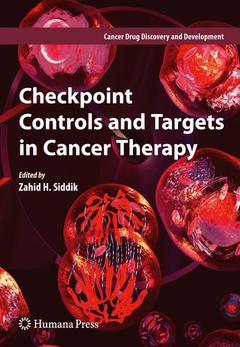Checkpoint Controls and Targets in Cancer Therapy, 2009 Cancer Drug Discovery and Development Series
Coordonnateur : Siddik Zahid H.

Much work over the last two decades has firmly established that loss of cell cycle checkpoint regulation, and resultant unabated cellular proliferation, is an inherent characteristic of cancer. This loss may occur through aberration in any single component involved in signal transduction pathways that orchestrate checkpoint regulation, which may manifest through either a failure to activate the checkpoint or a failure to respond to the activated checkpoint. In normal cells, checkpoint pathways are activated when genetic or cellular homeostasis is compromised, and signals are then transduced to re-stabilize homeostasis, and, failing this, to activate the apoptotic machinery to induce a cellular suicidal response. This implies that both survival and cell death pathways are induced following checkpoint activation, and that the final decision is dependant on the net result of integrating the two sets of signals.
It is intriguing that checkpoint pathways are also critical in cancer therapy to provide an apoptotic stimulus when cellular damage induced by the therapeutic agent is detected by the sensor system. Therefore, it is not surprising that failure in pro-survival checkpoint response will render tumor cells hypersensitive to cytotoxics and, conversely, failure in pro-apoptotic checkpoint response will induce genetic instability and/or therapeutic resistance. Understanding the intricacies of checkpoint response is, therefore, central to the design of therapeutic regimen that will enhance antitumor effects. Although early versions of this design entail combination of cytotoxic agents with cell cycle or checkpoint inhibitors, a greater understanding of the concepts could make such combinations clinically more effective. The contributions in this book will consolidate the current state of knowledge on checkpoint responses that may lay the foundation for hypothesis-driven rational approaches in advancing the management of cancer.
The immediate attraction of the book to the scientific community is that it represents a timely opportunity to build upon existing concepts of checkpoints to expand our understanding of the inner workings of the critical checkpoint machinery. The present understanding has provided ample appreciation that response to checkpoint activation is manifested through coordinated inhibition of cyclin-dependent kinase (CDK) complexes in G1, S and/or the G2 phase in order to arrest the cell cycle. Kinase inhibition can occur through several mechanisms, including inhibitory phosphorylation of CDK, destruction of the cognate cyclins, and recruitment of CDK inhibitors from the INK and WAF1/CIP1 families. However, the wealth of information from recent discoveries needs to be examined critically to consolidate our conceptual knowledge of checkpoints. At the same time, there is acute awareness in the diversity of checkpoint response between cytotoxic agents, and this serves as a reminder of the magnitude of complexity that is inherent in checkpoint regulation. This volume is intended to bring the cancer research community closer toward an improved understanding of this regulation, how checkpoint abnormalities can impact negatively on cancer therapy, and emerging strategies to target checkpoint response as a therapeutic end-point.
Date de parution : 03-2012
Ouvrage de 274 p.
17.8x25.4 cm
Date de parution : 09-2009
Ouvrage de 274 p.
17.8x25.4 cm
Thèmes de Checkpoint Controls and Targets in Cancer Therapy :
Mots-clés :
BRCA; DNA; cancer; cancer research; cancer therapy; cell; cell death; leukemia; lymphoma; ovarian cancer; research; resistance; tumor



